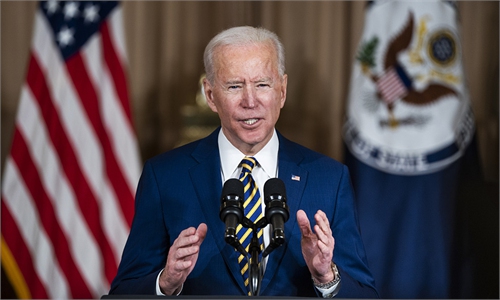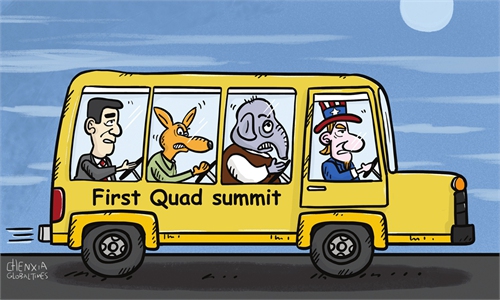
White House Photo:Xinhua
The leaders of the Quad countries, the US, Japan, India and Australia, issued a joint statement after their first online meeting on Friday. The statement did not mention China, but it contained a number of phrases that were specifically directed at China. For example, it mentioned that the Quad countries "will strive for an Indo-Pacific region unconstrained by coercion." Other issues, such as helping India expand vaccine production, had already been tagged toward China in advance of the meeting. Media outlets had commonly interpreted it as an effort to counter China in "vaccine diplomacy." Some media outlets even suggested that "China looms large at this meeting."
US National Security Advisor Jake Sullivan said on Friday's press briefing that "the four leaders did discuss the challenge posed by China, and they made clear that none of them have any illusions about China." He reiterated that "the Quad is not a new NATO," and also stressed that "it is an opportunity for these four democracies to work as a group." His expression is a little confused and contradictory.
The so-called Indo-Pacific strategy is a legacy of the Trump administration, and no one in the strategic community doubts that the Biden administration has inherited it and plans to advance it with the long-term goal to include more elements in containing China. The Asian version of NATO is how the Quad is portrayed in the press, and it is widely believed to fit well with Washington's ambitions.
Sullivan's denial of the appellation is also a kind of realism. He must know it's as difficult for Washington to build an Asian NATO as it is to turn all Asian countries into US states.
The statement of the four countries did not mention China at all, but the very fact reflects the different positions of the four countries on China. Their national interests require different strategies toward China. In fact, no country in Asia is willing to compete with China on the strategic front. They are all tempted or coerced by the US, and they are trying to decide on whether the benefits of following the US outweighs disadvantages of damaging their relations with China.
The Quad mechanism is still in its infancy and the US is determined to make it work by picking up any possible topic. It talked about climate change and COVID-19 vaccines, pinning the direction of the competition with China on these issues, with the intention of weakening China's influence in the whole region and pushing more Asia-Pacific countries to "decouple" from China.
The Indo-Pacific vision of the US was likely to come true if the US economy was booming while China's development was collapsing and was militarizing itself like Japan did 80 years ago. However, Washington misread both the global trend and the nature of its strategic competition with China.
China is the largest trading partner for Japan, Australia and India, as is the number one trading partner of most other Asia-Pacific countries. None of them has any real fear of being invaded by China. Japan and India have historical territorial disputes with China, and they obviously know it is better in their national interests to manage such disputes than to fight with China while relying on the US' support. The four Quad countries will have long-term differences and confusion over what the fundamentals of the Quad mechanism should be.
Those who dare not say but think of an Asian version of NATO in their minds are extremely poor in strategic thinking. George Frost Kennan, whose "Long Telegram" propelled the Cold War, seems to have become the "Jesus" of US' strategy. That "Long Telegram" can also be used as a trans-century "Bible." But the Asia-Pacific region is booming, and China is marching forward. China has just drawn up a new five-year plan, a plan to develop the country even further. The US has lost its way and the only sense of its strategic direction is how to undermine China.
The Quad, a cooperating group with an undeclared goal of confronting China, provides a scenario in which leaders of these four countries pretend to have done something important. It gives the lost countries a comfort of seeming to have found their way, and it creates a psychological massage that doesn't bring the will to solve the real problems they face but helps them to escape reality.
China will strengthen normal relations with Japan and India. Strategic confrontation with China is a bad gamble for Japan and India. China will not dwell on the disputes with the two countries in its relations with them. This will have a long-term disruptive effect on US' containment of China in what it refers to as the Indo-Pacific region. China will also strengthen its overall cooperation with ASEAN and other Asian countries, which will put more pressure on forces that adopt a hard line toward China in Japan, India and Australia.
The US has been swayed by a consideration of gain and loss between confrontation and cooperation with China. This basic reality tells people that whoever wants to isolate China throughout the region is destined to be isolated itself.



